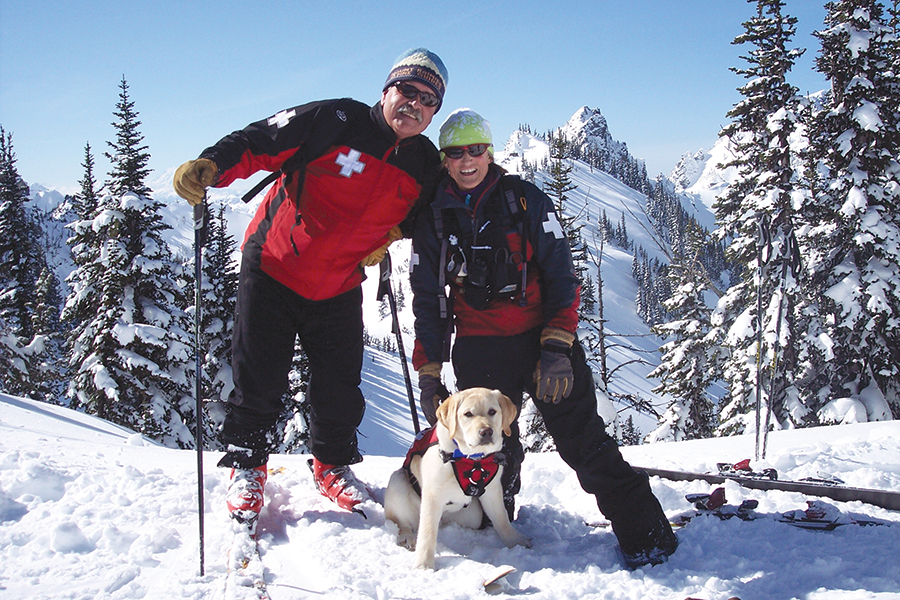
Home » Richland High grad is a ski, backcountry safety legend
Richland High grad is a ski, backcountry safety legend

March 15, 2021
One of Paul Baugher’s favorite memories of growing up in Richland involves snow.
On the rare occasions it accumulated, Baugher and his friends would slip into smooth-soled shoes and hold onto the bumper of a slow-moving car as it pulled them across compact snow and ice.
The child nearest the tailpipe would get a face full of exhaust. It was the 1960s and safety concerns didn’t get in the way of a good time.
“That was some of my first fun experience with snow,” said Baugher, who recently retired as head of the ski patrol at Crystal Mountain Resort after 32 years. It was just one of the roles he’s held improving safety in the skiing and backcountry worlds.
Baugher spent his career thinking about the ways people can die in the mountains and contemplating what needed to be done to reduce the risk. There is scarcely a skier or climber who hasn’t benefited from his work.
A ‘legend’
The National Ski Areas Association calls him a “legend.”
In addition to his work for Crystal Mountain, Baugher co-founded the Northwest Avalanche Institute, International Mountain Guides and is the ski industry’s go-to expert witness when accidents lead to lawsuits.
He is more than an expert witness, said David Byrd, director of risk and regulatory affairs for the National Ski Areas Association, based in Lakewood, Colorado. Baugher teaches avalanche safety courses for the institute and is a leader in educating skiers about the lethal danger getting trapped in tree wells.

“We are very blessed to have him,” Byrd said. “It is really thanks to Paul that the broader ski industry is as well versed on (tree well dangers) as we are.”
Aside from the odd Richland snowstorm, Baugher did not grow up immersed in winter sports. There just wasn’t enough snow for it to be a regular feature of winter life.
He graduated from Richland High School in 1972 and only took up skiing in his 20s, after he moved to Tacoma to study economics at the University of Puget Sound. Mount Rainier looms large over Tacoma and he took full advantage of it as his love of mountain adventures took hold.
Economics may seem an unlikely pursuit for a snow buff. Baugher said it was the right degree for his work.
“I always tell people my econ degree taught me how to think and to work out problems,” he said.
In retirement, he remains active as a legal consultant, climbing guide and avalanche forecaster, though he said he is scaling back.
During his career, he had his own brush with an avalanche. He’s also summited Mount Rainier more than 100 times.
Richland roots
Baugher’s parents moved to Richland shortly after World War II.
His father, a doctor, had made connections in the atomic world while at the University of Chicago. His late mother would recall a chilly greeting when she arrived at the Tri-City train station, “Oh you poor thing.”
The family lived off Howell Street, where he had a newspaper route.
An infamous disaster during his college career prompted his interest in mountain safety.
In 1974, he took a climbing course that involved camping on Mt. St. Helens, which wouldn’t erupt until 1980.
The course went off without a hitch, but a year later, on April 26, 1975, the subsequent class wasn’t so fortunate. Five Puget Sound students died in an avalanche while camping on the mountain.
And that wasn’t the only disaster that hit too close to home. Another friend, a topflight French climber, died in a separate mountaineering accident.
“Early on, I had immediate experience with the aftermath of accidents. I got really interested in that,” he said.
After college, Baugher joined the National Park Service as a climbing ranger in the Olympic Mountains, a role that led him to working on high altitude search and rescue missions. His first summer, he took part in an avalanche program, a gathering of the nation’s leading experts on the subject, then in its infancy.
He was hooked on learning how and why snow careens down mountainsides.
“That took me down the path,” he said.
Ski patrol
Crystal Mountain Resort would be his professional home for decades, as a patroller and as a risk manager.
“Ski areas are the main way to learn about avalanches,” he said. “You set them off, ski into them to learn about them.”
He has narrowly escaped an avalanche and even had to dig a companion out of one.

Tree wells, or “snow immersion,” caught his attention in 2004. He was working on a lawsuit involving an Oregon snowboard manufacturer. The complaint claimed a victim died by suffocation because snowboard bindings did not release the same way as those on skis.
Suffocation was described as an odd and unusual way to die on the slopes. But Baugher knew better. It happened on his own hill and he realized the danger needed attention. He would go to conferences for ski area operators, but people were more interested in avalanches than tree wells.
“For the first four or five years, I couldn’t get anyone to listen to me,” he said.
Victims are overwhelmingly young and male. While collisions account for more than half of the 40 or so ski fatalities each year, tree well or immersion deaths represent 15%-20%. The ski area association’s Byrd called it an “astonishing” number.
The fatality rate for skiers was 0.81 deaths per 1 million visits in the past season.
As Baugher’s experience grew, so did his responsibilities at Crystal Mountain. He directed the ski patrol and oversaw risk management – monitoring snow for conditions that can lead to avalanches and other dangers.
It’s a tricky balancing act. Ski areas and visitors both have a part to play.
There is give and take, as he demonstrated during a 2016 lecture on risk mitigation available on YouTube.
In the video, an expert skier gets his tips crossed and veers into a tree with a deep snow well around it. In a second, he disappears, leaving no sign of what happened. Fortunately, he was with a colleague who rescued him while a camera filmed the incident.
Another video showed what happened when ski area staff touched off a low angle avalanche as a precautionary safety measure. The unexpectedly large avalanche slammed into a chairlift, causing millions in damage but no injuries.
“When it comes to managing risk, I know what the ski area can do and what the (skier/snowboarder) can do,” he said.
It is a message he’s called on to share in courtrooms. Juries can shape the way ski areas operate through verdicts. He considers it his mission to give them a complete picture of risk and risk management.
“I have a seat at the table when the jury is saying, ‘The ski area should close all the runs and put seatbelts on the chairs,’” he said, describing unrealistic restrictions. “I want to be able to explain, ‘This is how this works. These are the problems, and this is why ski areas do it this way.’ ”
Work-life balance
Baugher and his wife, Lynn, have an adult daughter and a shared love of being in the mountains.
He said he’s fortunate that he never had to choose between family and the career that sustained him. He recalled an early climb to Camp Schurman on Mount Rainier with Lynn.
It was a miserable, cold, sleety day. They reached the cabin and dug it out. It was “ice cold” inside, with nothing but a Coleman lantern for comfort. Baugher imagined his wife, a flight attendant, would never climb again.
“She looked at me and said, ‘This is the coolest thing I’ve ever done!’ ” he said. “We’ve been doing this stuff ever since.”
The couple live in Enumclaw, equidistant from Crystal Mountain and the International Mountain Guides office and to SeaTac International Airport.
As he prepares to turn 67 this summer, Baugher said he’s preparing to leave International Mountain Guides. But he isn’t giving up on the fun side of his work.
He enjoys heli-skiing, skiing done at remote sites by skiers transported by helicopter, and calls Jackson Hole, Wyoming, and Alta/Snowbird in Utah his top ski spots, along with Crystal Mountain.
“There’s a reason why I stayed,” he said.
Want to stay safe on the slopes?
Visit these sites: nsaa.org/NSAA/Media/Industry_Stats.aspx; Deepsnowsafety.org.
Tri-City Connections is an occasional profile of Tri-City natives and former Tri-Citians who have had interesting careers. Contact editor@tcjournal.biz to suggest candidates.
Local News
KEYWORDS march 2021




